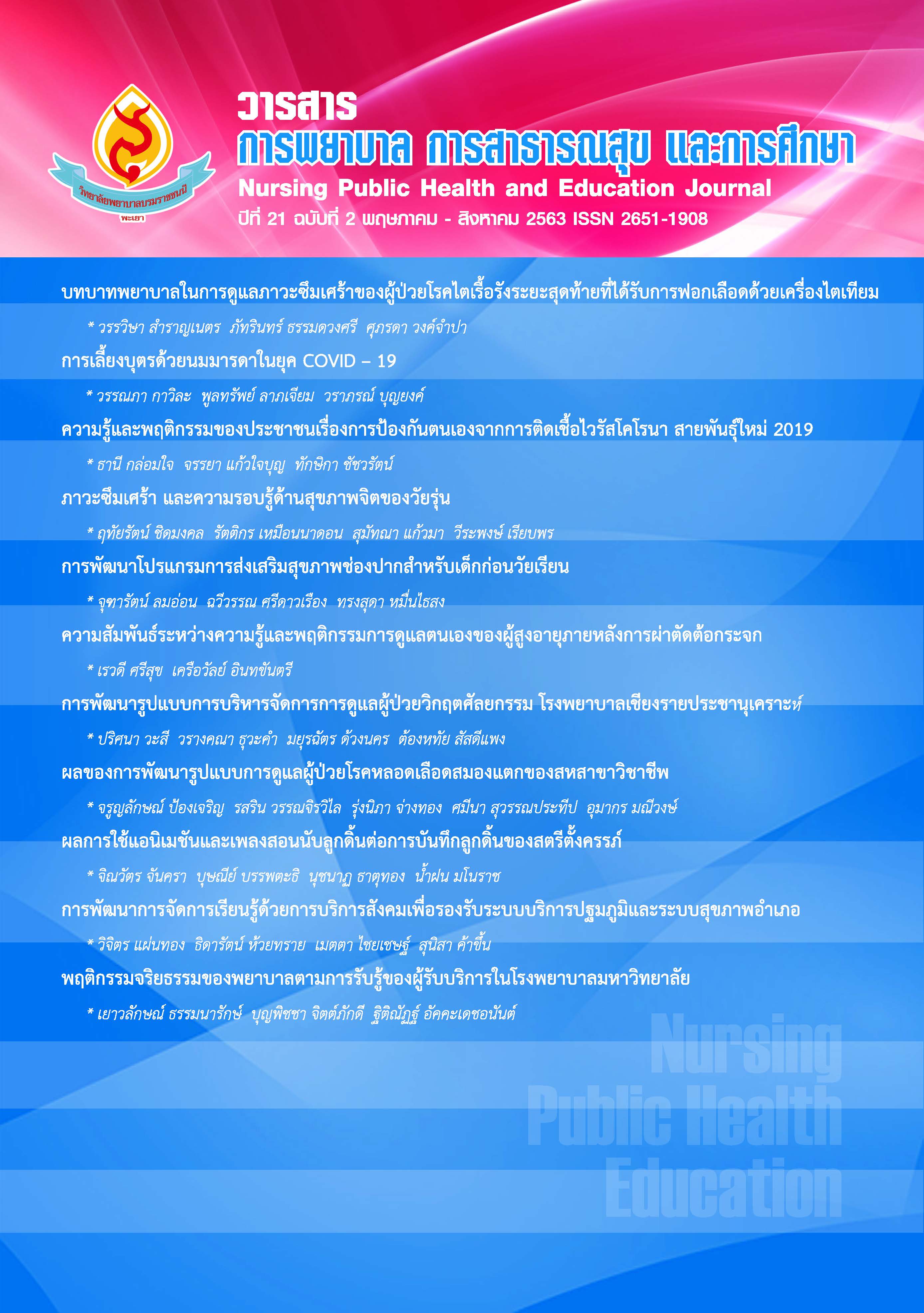ความสัมพันธ์ระหว่างความรู้และพฤติกรรมการดูแลตนเอง ของผู้สูงอายุภายหลังการผ่าตัดต้อกระจก
คำสำคัญ:
พฤติกรรมการดูแลตนเอง, ผู้สูงอายุ, โรคต้อกระจก, ความรู้, การผ่าตัดต้อกระจกบทคัดย่อ
โรคต้อกระจกจัดเป็นโรคที่ส่งผลกระทบต่อผู้สูงอายุโรคหนึ่ง สาเหตุส่วนใหญ่เกิดจากความเสื่อม หากได้รับการรักษาล่าช้า หรือได้รับการรักษาไม่ถูกวิธี รวมถึงหากมีความรู้ที่ไม่ถูกต้องในการปฏิบัติตัวภายหลังการผ่าตัดต้อกระจก อาจส่งผลให้ผู้สูงอายุตาบอดได้ การวิจัยเชิงสำรวจ (Survey study) มีวัตถุประสงค์เพื่อศึกษาความรู้และพฤติกรรมการดูแลตนเองของผู้สูงอายุภายหลังการผ่าตัดต้อกระจก และศึกษาความสัมพันธ์ระหว่างความรู้และพฤติกรรมการดูแลตนเองของผู้สูงอายุภายหลังการผ่าตัดต้อกระจก ที่เข้ารับการรักษาในโรงพยาบาลเจ้าพระยายมราช จังหวัดสุพรรณบุรี กลุ่มตัวอย่าง คือ ผู้สูงอายุที่มารับการตรวจตามนัดหลังผ่าตัดต้อกระจกที่แผนกผู้ป่วยนอกจักษุ โรงพยาบาลเจ้าพระยายมราช จำนวน 111 ราย เครื่องมือที่ใช้ครั้งนี้ได้แก่ แบบบันทึกข้อมูลส่วนบุคคล แบบทดสอบความรู้ภายหลังผ่าตัดต้อกระจก และแบบสอบถามพฤติกรรมการดูแลตนเองของผู้สูงอายุภายหลังผ่าตัดต้อกระจก ได้ค่าดัชนีความตรงตามเนื้อหา (content validity index : CVI) เท่ากับ 0.7และ 0.84 ตามลำดับ และตรวจสอบค่าความเชื่อมั่นของแบบทดสอบความรู้ภายหลังการผ่าตัดต้อกระจกได้เท่ากับ 0.64 และแบบสอบถามพฤติกรรมการดูแลตนเองของผู้สูงอายุภายหลังผ่าตัดต้อกระจกได้เท่ากับ 0.91 วิเคราะห์ข้อมูลส่วนบุคคล และความรู้ภายหลังการผ่าตัดต้อกระจก โดยใช้สถิติพรรณนา และสถิติสัมประสิทธิ์สหสัมพันธ์ของเพียร์สัน ผลการวิจัยพบว่า ผู้สูงอายุมีความรู้ภายหลังการผ่าตัดต้อกระจกโดยรวมอยู่ในระดับปานกลาง ร้อยละ 54.1 และมีความรู้ภายหลังการผ่าตัดต้อกระจกที่ถูกต้องโดยรวม ร้อยละ 62.61 นอกจากนี้ผู้สูงอายุภายหลังการผ่าตัดต้อกระจกมีพฤติกรรมการดูแลตนเองโดยรวมอยู่ในระดับดี ร้อยละ 88.30 ผลการวิเคราะห์ความสัมพันธ์พบว่าความรู้เกี่ยวกับโรคต้อกระจกภายหลังการผ่าตัดต้อกระจกมีความสัมพันธ์กับพฤติกรรมการดูแลตนเองของผู้สูงอายุภายหลังการผ่าตัดต้อกระจกอย่างมีนัยสำคัญทางสถิติ (p < .01, r = .273) จากการศึกษาครั้งนี้แสดงให้เห็นว่าผู้สูงอายุภายหลังการผ่าตัดต้อกระจกมีความรู้โดยรวมอยู่ในระดับปานกลาง และความรู้มีความสัมพันธ์กับพฤติกรรมการดูแลตนเองภายหลังการผ่าตัดต้อกระจก ดังนั้นควรมีการส่งเสริมความรู้โดยเน้นเกี่ยวกับเรื่องการออกกำลังกายที่เหมาะสม อาหารที่ควรรับประทานและควรหลีกเลี่ยงภายหลังการผ่าตัดต้อกระจก รวมถึงอาการหรือพฤติกรรมต่างๆ ที่ต้องใช้แรงเบ่ง ซึ่งเป็นสาเหตุหนึ่งที่เป็นสาเหตุทำให้เกิดความดันในลูกตาภายหลังการผ่าตัดต้อกระจก เพื่อส่งเสริมให้ผู้สูงอายุมีความรู้ความเข้าใจ จนเกิดความเชื่อมั่นและปฏิบัติตัวในการดูแลตนเองภายหลังการผ่าตัดต้อกระจกได้อย่างมีประสิทธิภาพยิ่งขึ้น
เอกสารอ้างอิง
งามจิตต์ เกษตรสุวรรณ. (2561). โรคของแก้วตา (Disease of the Lens). ใน วิศนี ตันติเสวี (บรรณาธิการ), ตำราจักษุวิทยา. กรุงเทพฯ: บริษัท พิมพ์ดี จำกัด.
ดิเรก ผาติกุลศิลา. (2561). ต้อกระจก (Cataract). ใน สมสงวน อัษญคุณ (บรรณาธิการ), โรคตาที่พบบ่อยในเวชปฏิบัติ. พิมพ์ครั้งที่ 3. เชียงใหม่: บริษัท วิทอินดีไซด์ จำกัด.
ดุษฎี เอกพจน์ และพิทยา สัจจารักษ์. (2561). ปัจจัยที่มีความสัมพันธ์กับพฤติกรรมการป้องกันภาวะแทรกซ้อนผู้ป่วยผ่าตัดต้อกระจกใส่เลนส์แก้วตาเทียม โรงพยาบาลมหาราชนครศรีธรรมราช. วารสารวิชาการแพทย์เขต 11, 32(1), 157 - 166
บุญธรรม กิจปรีดาบริสุทธิ์. (2553). เทคนิคการสร้างเครื่องมือรวบรวมข้อมูลสำหรับงานวิจัย. พิมพ์ครั้งที่7. กรุงเทพฯ: ศรีอนันต์การพิมพ์.
พรชัย สิมะโรจน์ และอนุชิต ปุญญทลังค์. (2561). Cataract. ใน อาภัทรสา เล็กสกุล (บรรณาธิการ), จักษุวิทยารามาธิบดี. กรุงเทพฯ: บริษัท ธรรมสาร จำกัด.
มุกดา เดชประพนธ์ และปิยวดี ทองยศ. (2559). ปัญหาทางตาที่พบบ่อยและการสร้างเสริมสุขภาพตาในผู้สูงอายุ. รามาธิบดีพยาบาลสาร, 20(1), 1-9.
รังสรรค์ คีละลาย และประเสริฐ ประสมรักษ์. (2560). ผลของรูปแบบการส่งเสริมการดูแลตนเองในชุมชนของผู้ป่วยหลังผ่าตัดต้อกระจก ในพื้นที่โรงพยาบาลส่งเสริมสุขภาพ ตำบลนากอก อำเภอเลิงนกทา จังหวัดยโสธร. วารสารการพัฒนาสุขภาพชุมชน มหาวิทยาลัยขอนแก่น, 5(2), 241-258.
ลักษณาพร กรุงไกรเพชร. (2561). ต้อกระจกในผู้ป่วยเบาหวาน. บูรพาเวชสาร, 5(1), 95 -103.
ศิริลักษณ์ กิจศรีไพศาล และบังอร ปีประทุม. (2555). การรับรู้และความต้องการความรู้ที่จําเป็นสําหรับการดูแลตนเองของผู้ป่วยและผู้ดูแลที่ได้รับการผ่าตัดต้อกระจกแบบไม่ค้างคืน. วารสารวิทยาศาสตร์และเทคโนโลยี, 20(5), 437 – 448.
สุรพีย์ มาสมบูรณ์. (2553). ปัจจัยที่มีผลต่อพฤติกรรมการดูแลตนเองของผู้ป่วยโรคต้อกระจกที่มารับการผ่าตัดต้อกระจกใส่เลนส์แก้วตาเทียมในโรงพยาบาลพระมงกุฎเกล้า. วิทยานิพนธ์วิทยาศาสตรมหาบัณฑิต (สุขศึกษา) มหาวิทยาลัยเกษตรศาสตร์.
อารยา สิมานุรักษ์. (2557). ปัจจัยที่ส่งผลต่อพฤติกรรมการดูแลตนเองหลังผ่าตัดใส่เลนส์เทียมของผู้สูงอายุจังหวัดอุบลราชธานี. วิทยานิพนธ์สาธารณสุขศาสตรมหาบัณฑิต มหาวิทยาลัยราชภัฎอุบลราชธานี.
Eichenbaum, J. W. (2012). Geriatric vision loss due to cataracts, macular degeneration, and glaucoma. Mount Sinai Journal of Medicine, 79(2), 276-294.
Harris, M., Bayer, A. & Tadd, W. (2002). Addressing the information needs of older patients. Reviews in Clinical Gerontology, 12(1), 5 – 11.
ดาวน์โหลด
เผยแพร่แล้ว
รูปแบบการอ้างอิง
ฉบับ
ประเภทบทความ
สัญญาอนุญาต
ลิขสิทธิ์ (c) 2020 วารสารการพยายาล การสาธารณสุข และการศึกษา

อนุญาตภายใต้เงื่อนไข Creative Commons Attribution-NonCommercial-NoDerivatives 4.0 International License.



